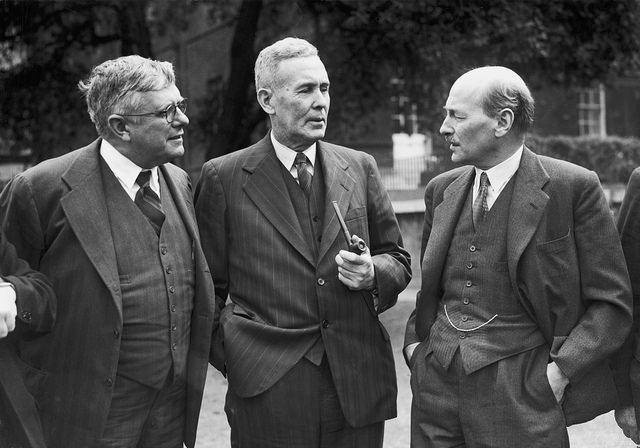Parliamentary language should be updated, but the modernisation of our political institutions mustn’t stop there
John Bercow, the Speaker of the House of Commons, recently suggested that the old-fashioned language in use in Parliament may further reinforce the public’s sense of distance with democracy. Assessing his claims, Andrew Scott Crines argues that language is a problem, but that it would be a mistake to stop there, with the physical shape of the House of Commons, and the voting system in particular acting as a barrier to public engagement.

Have things moved on since Clem’s time? (Credit: Chifley Research Centre, CC BY 2.0)
The Speaker’s comments over Parliamentary language, the terms of address for members, and the use of the word ‘strangers’ to describe members of the public speaks to a painfully slow modernisation agenda that has simmered in the background of British politics for much of the last century. It has been a modernisation agenda driven by tweaking and minor changes, whilst eschewing major the major change needed to present a truly representative Parliamentary democracy.
In part the slowness can be attributed to a belief that tradition and sameness represent continuity and stability. Such stability attempts to produce an environment conducive to economic growth. However, that stability has also had a number of consequences with regards to the overall quality of Britain’s democracy and its relevance to modern society.
Centrally, Bercow’s broader agenda has been to counter this by making the institutional functions of Parliament appear more relevant. This is necessary because Parliament’s distinctiveness through language and, to a large extent appearance has given it an image of difference, which has the consequence of reducing its capacity to claim broader representative legitimacy. Put simply, in terms of gender, race, and sexuality the composition of the Commons appears unrepresentative of the Britain’s social makeup. This is compounded by elements of the language of Parliament which solidify this distance by making it appear even more alien.
Furthermore, Bercow rightly argues that the expenses scandal continues to taint the reputation of Parliamentarians because that sense of embedded ‘corruption’ remains. Although not a fair image, it has nevertheless gained salience in some sections of society. The legacy of the expenses scandal speaks to a distinctly media constructed image of a Parliament detached from reality. More than that however is the importance of normalcy. Today’s Parliamentarians are held in public contempt because of their artificially constructed difference. Thus Bercow is striving to undo some of that damage in order to demonstrate relevance, and thereby enhance the reputation of Parliament.
To a large extent the changes to the terms of the address in the Commons and beyond represent baby-steps in Parliamentary modernisation. This is compounded because Westminster is now a Parliament amongst others, with the circular chambers of the Scottish Parliament, Northern Ireland Assembly, Welsh Assembly, and European Parliament showcasing a more modern form of political language and procedure.
Their language appears more relevant because their relative newness has enabled them to more closely reflect the people they represent. They have not been held back by centuries of tradition and procedures which appear peculiar to a modern political system. For example the physical openness of the Welsh Assembly’s chamber and public gallery presents an air of clarity which contrasts sharply with relative smallness of the ‘strangers gallery’ in the Commons.
To fit Westminster within this family of Parliaments it will necessitate changes more dramatic than simply discarding a small number of linguistic anachronisms. Although modernisation necessitates change, and Bercow is keen to push this kind of agenda through political and academic bodies such as the Crick Centre, a truly representative Commons will need to draw inspiration from the other Parliaments and Assemblies of the United Kingdom and beyond.
I would suggest the first step needed in modernising the Commons should come in the voting system. A more proportional voting system (PR) would enable a fairer Parliamentary representation of the votes cast to emerge. The more representative members would, most likely, be more open to further modernisation along the lines outlined by the Speaker. Essentially, through a more representative system, members would be more likely to come from a wider range of social backgrounds, and with it a more eclectic appreciation of the English language.
Furthermore, PR would also necessitate more coalition governments, thus the physical structure of the Commons – which is designed for two adversarial parties – would no longer be fit for purpose. Indeed, many may argue that it is already unfit for the purpose of three party politics, and that as more parties grow their representation in the Commons (the SNP and UKIP) the opposition benches will fill up faster than the government benches.
Thus here the Commons could take further inspiration from the Scottish Parliament, Welsh Assembly and European Parliament by moving to a purpose-built circular chamber. Granted this would, most likely, mean handing Westminster Palace over to a protective body such as English Heritage for the purposes of preservation as a museum. However the broader benefits to the British political system would be exactly what Bercow is seeking – relevance. Furthermore, a new chamber would enable further modernisation of language, with the result being a body closer to the people with a much more representative collection of members.
So, why are these changes necessary?
Because at the moment Westminster is a living anachronism which does not fit within the broader family of UK Parliaments. It is, for lack of a better description, a 19th century Grandfather clock in the age of cyber technology. Whilst the Grandfather clock is still telling the time, it cannot do what is necessary in the modern world because it is a product of a bygone era. Nice to look at, perhaps, but not much use if one wants to connect to the internet! Parliament is, of course much more important than an antique. Because it exists to keep the executive to account, it needs to be constituted in such a way as to carry out this role in a manner that reflects modern Britain.
Thus, Bercow’s suggestions on Parliamentary language are to be welcomed, however they must be taken as the very first steps in addressing what are much broader problems – relevance, normalcy, and representation. Only by addressing these directly can Bercow’s longer term aspiration of a chamber not held in public contempt be fulfilled. I fear, however that because our politicians live within the anachronism that genuine change may be some time off. However it would be prudent to embrace Bercow’s modernisation agenda because the longer the Commons appears detached, the less the electorate will entertain the anachronism, thereby pushing their votes further to the fringes of an increasingly disaffecting political choice.
—
Note: this article gives the views of the author, and not the position of Democratic Audit UK or the LSE. Please read ourcomments policy before posting.
—
 Andrew S Crines researches oratory and rhetoric in British party politics at the University of Leeds. He has co-edited with Richard Hayton two volumes focused on oratory in Labour and Conservative party politics respectively, and he has also published in a wide range on academic journals. Andrew is also the Publicity Officer of the PSA Conservatives and Conservatism Group. He tweets @AndrewCrines
Andrew S Crines researches oratory and rhetoric in British party politics at the University of Leeds. He has co-edited with Richard Hayton two volumes focused on oratory in Labour and Conservative party politics respectively, and he has also published in a wide range on academic journals. Andrew is also the Publicity Officer of the PSA Conservatives and Conservatism Group. He tweets @AndrewCrines





 Democratic Audit's core funding is provided by the Joseph Rowntree Charitable Trust. Additional funding is provided by the London School of Economics.
Democratic Audit's core funding is provided by the Joseph Rowntree Charitable Trust. Additional funding is provided by the London School of Economics.
PR gains support across politics spectrum but not MPs, Why? https://t.co/iOOVAdXRbU @LabourSheffield @SheffLibDems @SheffieldGreens
RT @democraticaudit: Parliamentary language should be updated, but the modernisation of our political institutions mustn’t stop there http:…
Rather surprised with how popular this piece on reform for @democraticaudit has turned out to be! https://t.co/HvZhhQNV35 #cameronspeech
#Parliamentary language should be updated, but modernization shouldn’t stop there @democraticaudit https://t.co/Qj4zn6o1dz
Gave the @CrickCentre a sly plug in my latest blog about John Bercow’s pushes for greater Parliamentary reform! https://t.co/HvZhhQNV35
Barriers to public engagement in UK:old-fashioned language of MPs/physical shape of HC/Voting system https://t.co/evXOxPggr5
Parliamentary language should be updated, but political modernisation mustn’t stop there https://t.co/P1nfJnLtK0 https://t.co/5HGcruKsUR
Parliamentary language should be updated, but the modernisation of our political institutions mustn’t stop there https://t.co/GGpkAwAvfj
Here I go ‘all Carswell’ by calling for changes to Parliament, PR, new chambers… basically, utter renewal! #bbcdp https://t.co/gwTWxtxXUm
Parliamentary language should be updated, but the modernisation of our political institutions mustn’t stop there https://t.co/xoWFej6hxI
Great article @andrewcrines in @democraticaudit on why parliamentary language+ other practices should be updated UK https://t.co/AzdJzLqi0m